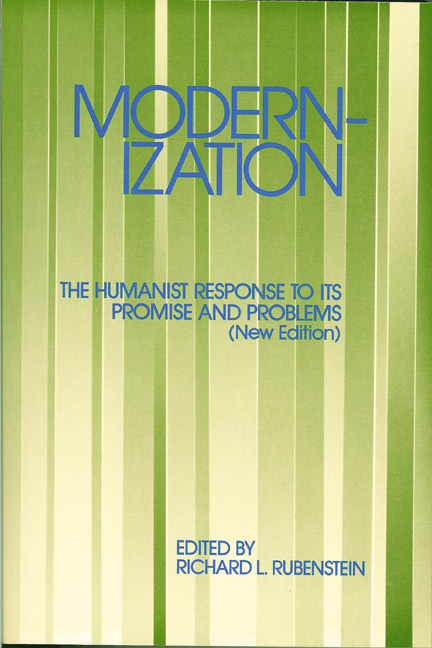This collection of essays examines the aspects of the modernization process and its religious, social, environmental and political consequences. Modernization, in this sense, means the growth and diffusion of a distinctive set of institutions and values rooted in the technological transformation of the economy and the organization of the state. Alternatively, modernization can be understood as an expression of the triumph of functional rationality, a rationality of means rather than ends as the predominant mode of problem-solving in human affairs.
All the authors in this book are humanists in the sense they are fundamentally concerned with the quest for value by which men and women can sustain themselves. These papers reflect an underlying concern with the impact of the worldwide trend toward the modernization of the economy and society on contemporary religion, ethics and politics.–from the Introduction by Richard L. Rubenstein
Table of Contents
Preface
Introduction
Part 1: Contemporary Images And The Quest For Values
Section A: Technological Civilization And The Environment
Al Paul Shepard
The Conflict of Ideology And Ecology
Sigmund Kvaloy
Commentary: Touristic Lifestyles Versus Work in Nature
A2 John Rodman
Theory And Practice in The Environmental Movement: Notes Toward an
Ecology of Experience
A3 Joseph W. Meeker
Fields of Danger And The Wilderness of Wisdom
Section B: The Legitimation Crisis And The Quest For a New Consensus
B1 Mary Catherine Bateson
Metaphors of Kinship
B2 Lonnie D. Kliever
Authority in a Pluralistic World
Joseph Bettis
Commentary
Gabriel Vahanian
Commentary
B3 George P. Grant
Faith and The Multiversity
Jean-Guy Lemarier
Commentary
Herbert Richardson
Commentary
Section C: The Individual And The Political Order
C1 Andrew J. Reck
The Reciprocity of Authority And Liberty
C2 Gerald Mccool
Freedom And Authority
C3 Klaus Rohmann
From Authority to Absolute Dominion in Our Administered World
C4 Richard L. Rubenstein
The Elect and The Preterite
Section D: Contemporary Images of Death
D1 Ninian Smart
The Anatomy of Death
Alfred Alvarez
Commentary
D2 Ben-Ami Scharfstein
Death as a Source of Philosophy
D3 Joyce Carol Oates
The Art of Suicide
Section E: Contemporary Images of Salvation
El Etienne Trocme
Redemption Today: Back to The New Testament
E2 Maurice Boutin
Marx and the Question of Salvation
Part II: Religious Responses to Modernization
Section F: The Persistence of Religious Aspects of Experience
F1 Edward A. Robinson
Aspects of Religious Consciousness
F2 Eileen W. Barker
Introduction to Eugene P. Wigner's 'The Existence of Consciousness'
F3 Eugene P. Wigner
The Existence of Consciousness
R. J. Zwi Werblowsky
Commentary
Section G: Comparitive Religious Responses to Modernization
G1 Ravi Ravindra
The Problems of Modernization in 'Hinduism'
G2 Mohammed AI-Nowaihi
Religion and Modernization: the General Problem and Islamic Responses
G3 R. J. Zwi Werblowsky
Modernism and Modernization in Buddhism
David J. Kalupahana
Commentary
Section H: Religion and Science: Convergent or Divergent Definitions
of Reality
HI Donald R. Ferrell
Beyond Scientism: Science and Religion in Dialogue
Morris I. Berkowitz
Commentary
H2 Ben-Ami Scharfstein
On the Structural Resemblances in Ultimate Religious, Philosophical
and Scientific Thought
Index
RICHARD L. RUBENSTEIN, a theologian and historian, is the President of the University of Bridgeport, Connecticut. He is the author of numerous books including After Auschwitz: Radical Theology and Contemporary Judaism, The Religious Imagination, Morality and Eros, My Brother Paul, Power Struggle, The Cunning of History, and The Age of Triage.




